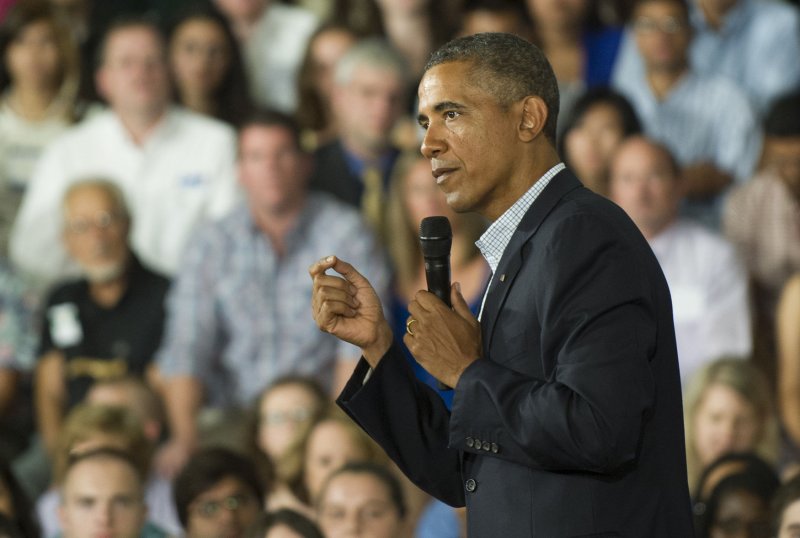U.S. President Barack Obama holds a town hall meeting on college affordability at Binghamton University, in Binghamton, N.Y., Aug. 23, 2013. UPI/Kevin Dietsch |
License Photo
BINGHAMTON, N.Y., Aug. 23 (UPI) -- U.S. law schools could probably be reduced to two years instead of the current three to cut costs for students, President Barack Obama said Friday.
"You know, I believe ... that law schools would probably be wise to think about being two years instead of three years, because ... in the first two years, young people are learning in the classroom," Obama said during a town-hall meeting at Binghamton University, part of the State University of New York system. "The third year, they'd be better off clerking or practicing in a firm even if they weren't getting paid that much, but that step alone would reduce the costs for the student."
Can law schools maintain quality and keep good faculty and sustain themselves if the third year goes away?
"My suspicion is that if they thought creatively about it, they probably could," he said.
"Now, if that's true at a graduate level, there are probably some things that we could do at the undergraduate level, as well," the president said.
He said he didn't want to take a "cookie-cutter approach" that doesn't take in quality.
"The idea is understanding [that] we've got to maintain high quality," Obama said. "Are there ways that we can reorganize schools, use technology, think about what works so that overall we're creating a better value for the student?"
On the steep cuts to the Head Start early childhood education program, Obama said the across-the-board cuts to the program in through the sequester -- and indications that the Republican-controlled House is considering deeper cuts -- may be considered penny wise but pound foolish.
"Study after study has shown that the biggest bang for the buck that we get when it comes to education is to invest early. If we get 3-year-olds, 4-year-olds well prepared when they start school, that momentum continues," he said.
When the federal budget debate begins in September, Obama pledged to fight for Head State and said he believed "we can have a budget that is sensible, that doesn't spend on programs that don't work, but does spend wisely on those things that are going to help ordinary people succeed."
Obama reiterated much of what he said Thursday when he unveiled his education initiative at the University of Buffalo, saying it is important to refocus attention on issues that affect the middle class and that a post-secondary education was vital to improve the middle class and help people aspire to the middle class.
"What we need to do is focus on the pocketbook bread and butter issues that affect all of you: making sure we've got good jobs with good wages, a good education, a home of your own, affordable health care, a secure retirement and a way for people who are currently in poverty to get out of poverty," Obama said. "That's what we should be spending our time thinking about when it comes to domestic policy. That's what's always made America great. And nothing's more important to that process than what we're doing in terms of K-12 education and higher education."
The problem, he said, is that at a time when higher education has never been more important, it also has never been more expensive.
His plan has three components.
"Number one, we want to start rating colleges based on how well they're doing in providing good value and opportunity for students," Obama said.
Second, he said, the administration wants to jump-start competition among colleges and states to develop more innovative ways to reduce costs to students.
Third, he said, "expand and better advertise a program that we put in place and expanded when I came into office ... for college graduates who do have debt [that caps] monthly payments that you have to make to 10 percent of your income."
In Buffalo, he said he wanted to reconsider how federal aid was distributed to colleges and universities based on the rankings.
Students, too, would do their part if they receive federal aid by completing coursework each semester before receiving aid for the next semester under his plan.
"I think the essence of the American dream is that anybody who's willing to work hard is able to get that good education and achieve their dreams," Obama said before getting into the question-and-answer session. "And central to that is the issue that, you know, you've got a big sign there, we try to message effectively, college affordability, making sure that people can afford to go to college."















